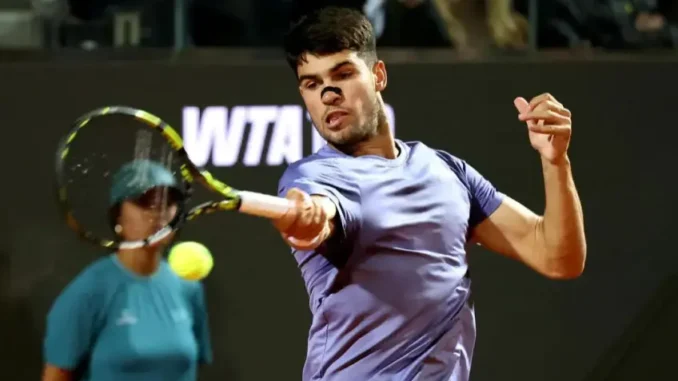
Carlos Alcaraz, the 22-year-old Spanish tennis phenom, has been under scrutiny lately, with some questioning his consistency despite a stellar season. Former world No. 3 Milos Raonic, now nearing retirement, recently stepped into the fray, passionately defending Alcaraz and labeling the criticism surrounding him as “the dumbest thing.” In a candid podcast appearance, Raonic offered a seasoned perspective on why Alcaraz faces such intense scrutiny and why it’s misguided, shedding light on the natural evolution of a young star navigating the pressures of professional tenis.
Alcaraz’s 2025 season has been nothing short of impressive. With victories in Rotterdam and the Monte-Carlo Masters, where he claimed his sixth ATP Masters 1000 title, the world No. 3 has proven his mettle on the global stage. His clay-court campaign has been particularly strong, highlighted by a final appearance in Barcelona and a commanding performance at the Italian Open, where he secured two straight-set wins. Yet, despite these achievements, Alcaraz has faced criticism for early exits in tournaments like the Miami Open and for perceived inconsistency, especially on hard courts. Some fans and analysts have even drawn comparisons between Alcaraz’s rivalry with Jannik Sinner and the legendary “Big Three” era of Roger Federer, Rafael Nadal, and Novak Djokovic, a comparison Raonic finds unfair.
Speaking on the Changeover Podcast, Raonic didn’t mince words. “Alcaraz is kind of going through this moment where people are questioning him a little bit, which I think is the dumbest thing,” he said. He argued that Alcaraz is simply transitioning into the “second phase” of his career, a period where the initial wave of surprise victories gives way to heightened expectations. “At the beginning, everything was positive, and it was almost a surprise that he could dominate some of his adversaries,” Raonic explained. “There wasn’t this pressure that exists when people believe you can’t lose to certain opponents.” This shift, he noted, is a natural part of a young player’s growth, especially for someone like Alcaraz, who burst onto the scene with a 2022 US Open title at just 19, becoming the youngest man to reach world No. 1.
Raonic’s defense highlights the unique challenges Alcaraz faces as a generational talent. With four Grand Slam titles already under his belt—including the 2023 Wimbledon and 2024 French Open and Wimbledon crowns—Alcaraz has set an extraordinarily high bar. His electrifying style, marked by creative shot-making and relentless athleticism, has drawn comparisons to Nadal, but it’s his off-court persona that adds another layer of complexity. Alcaraz’s Netflix documentary, Carlos Alcaraz: My Way, revealed a young man grappling with the weight of fame, occasionally clashing with his team over professionalism and time management. His agent, Albert Molina, was caught on camera chastising him for tardiness, saying, “It doesn’t matter if you’re number one in the world, nobody has to wait for you, Carlos.” Alcaraz, ever self-aware, responded with humility: “I know I’m not in a position to say anything. I’m in a position to lower my head and take the hits.”
This glimpse into Alcaraz’s life has fueled some of the criticism, with detractors questioning whether his relaxed demeanor and love for enjoying life off the court—evident in his social media presence and playful on-court antics—undermine his commitment. Raonic, however, sees this as a strength. He believes Alcaraz’s ability to embrace his personality, even under scrutiny, is a sign of maturity. “You’re on a good run, and that momentum carries you, but then you hit a wall, and you have to figure out what’s next,” Raonic said, emphasizing that Alcaraz is navigating this phase with grace.
The Canadian veteran also pointed out the unfairness of comparing Alcaraz and Sinner to the Big Three. “The Big Three were further apart from the rest of the field than Alcaraz and Sinner are today,” he noted, suggesting that the current era’s depth makes consistency harder to maintain.
Leave a Reply